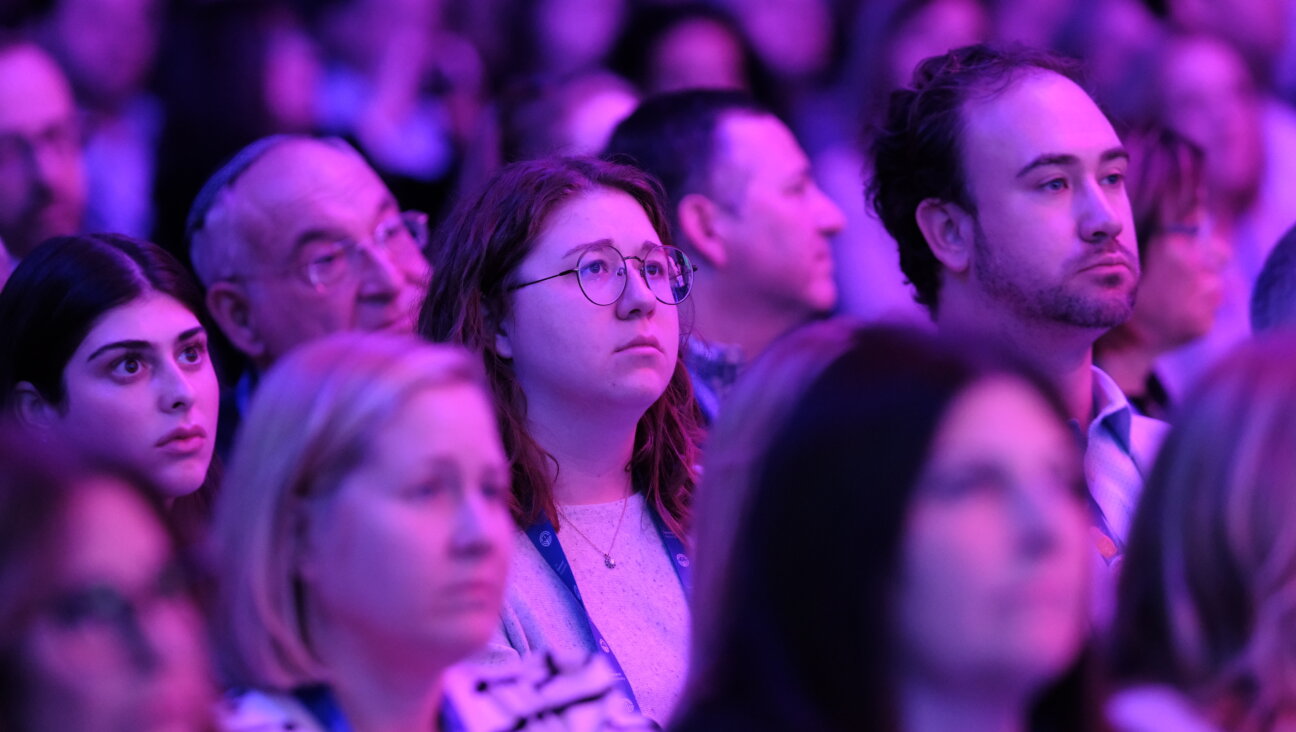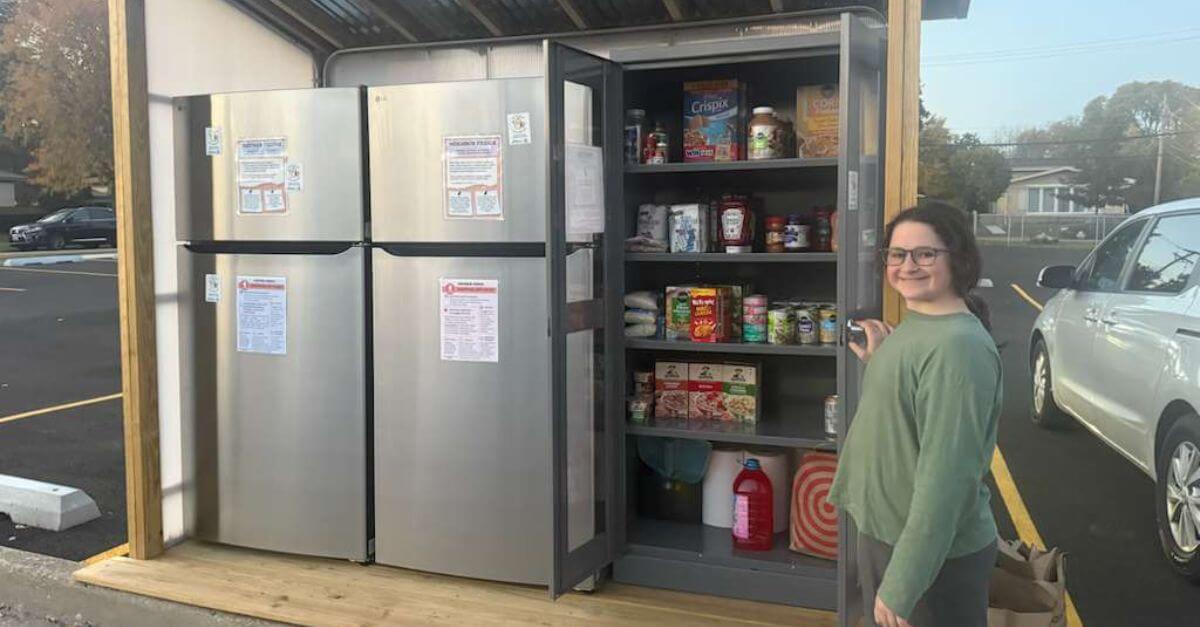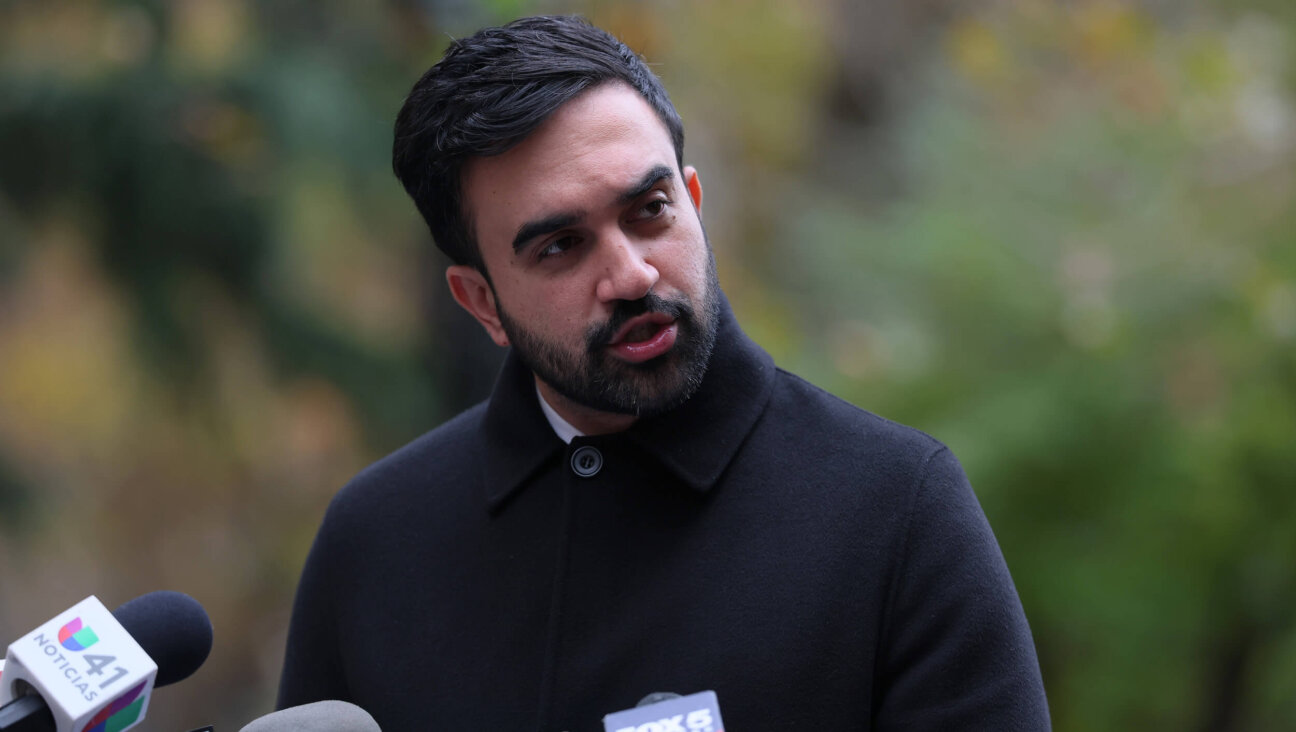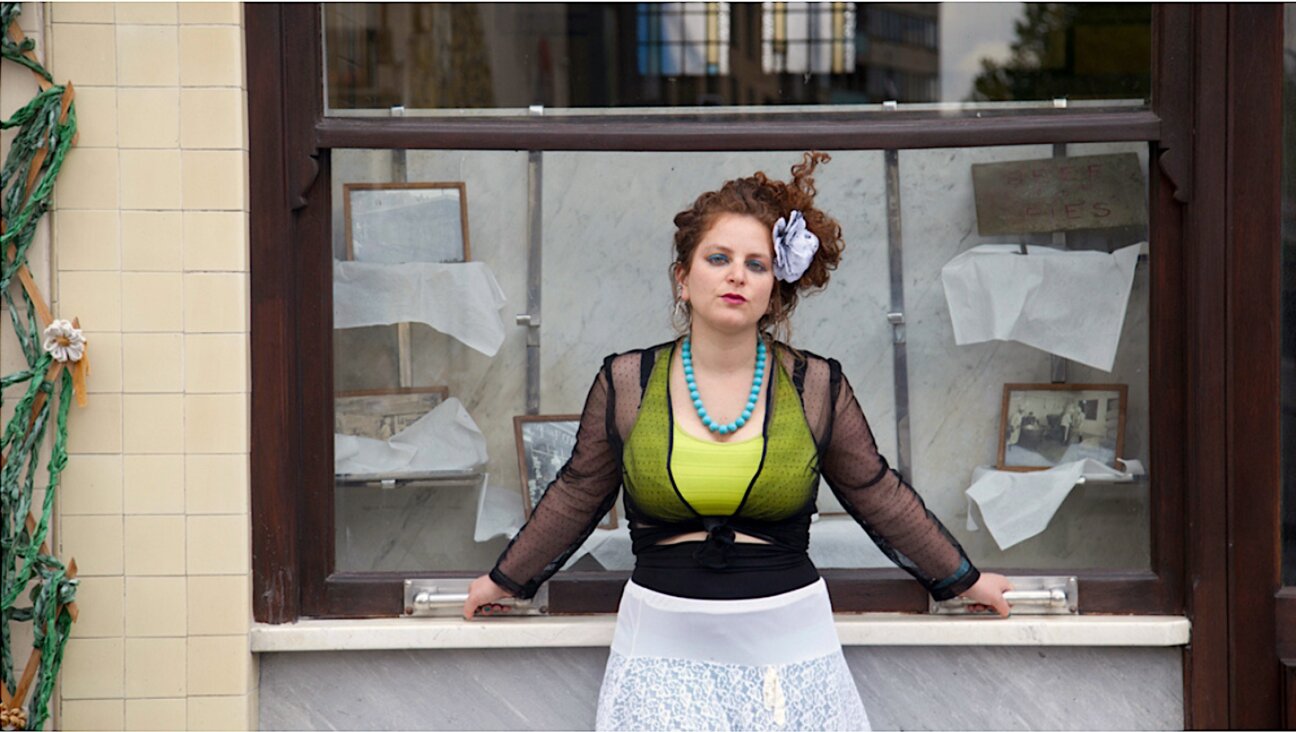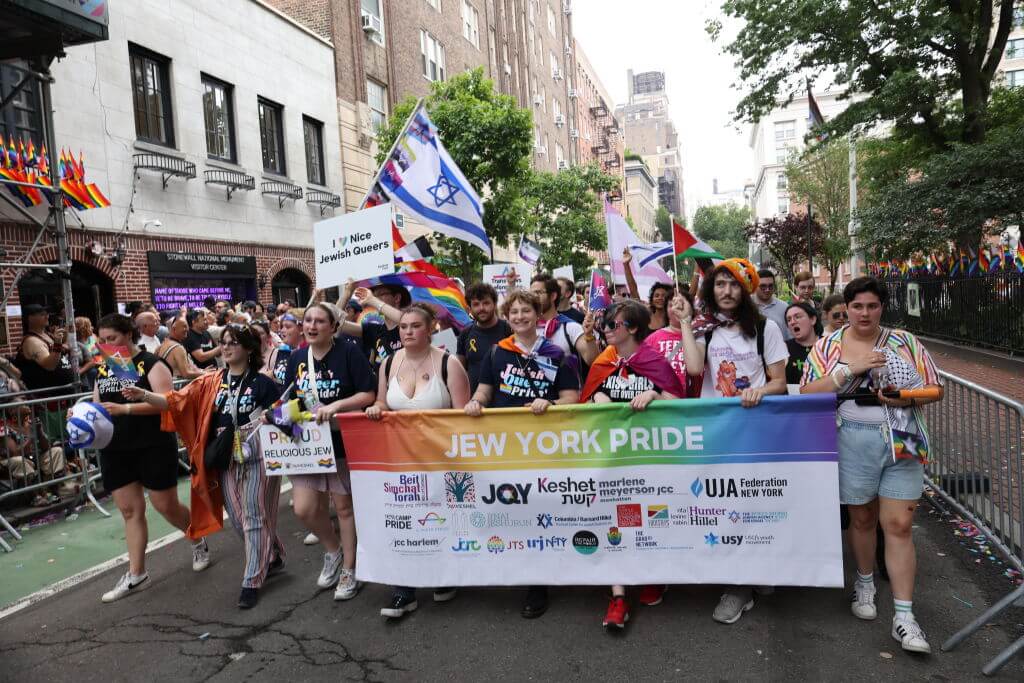Orthodox Jewish Groups Exploit E-Rate Library Subsidy Program

Graphic by Angelie Zaslavsky
Down a gritty dead-end alley in ultra-Orthodox Brooklyn, past a loading dock and a couple of dumpsters, a set of stairs leads up to a small room with bare walls and a dozen computers.
The plaque on the door at Kollel L’Horauh calls the room a library. As a library, it has received $135,000 in congressionally mandated library subsidies. But there’s no librarian, and the room’s “collection” consists of a subscription to a single digital database of Jewish books that is not even available on all the computers. In Brooklyn, not being a library is no barrier to receiving library subsidies. A Forward investigation has found that E-Rate, the federally backed library subsidy program, has committed $1.4 million to ultra-Orthodox religious institutions in Brooklyn that don’t actually qualify as libraries.
Nine such groups have received an average of $161,000 in commitments from E-Rate since 2010 — more than twice the average amount committed to libraries in New York State during the same period.
The library association legally tasked with serving as a gatekeeper for E-Rate eligibility in New York City chose not to exclude these ultra-Orthodox groups, which in some cases didn’t have librarians or card catalogs.

Image by Ariel Jankelowitz
That wasn’t their only option. Elsewhere in New York, another gatekeeper agency has taken a stand to block questionable libraries from E-Rate. In 2010, around the same time that the Brooklyn ultra-Orthodox groups were seeking to become E-Rate eligible, a “flurry” of ultra-Orthodox congregations from Rockland County, N.Y., applied to join an upstate library association and become E-Rate eligible, too, according to John Shaloiko, executive director of the Southeastern New York Library Resources Council.
“We didn’t want to take just any organization in when it believes it should get E-Rate when it’s not really a library,” said Shaloiko, whose group serves as the E-Rate gatekeeper for a handful of counties to the north of New York City.
Prompted in part by concerns over the legitimacy of the ultra-Orthodox applicants, Shaloiko’s group drew up new library membership guidelines, requiring that area libraries have online card catalogs and librarians with master’s degrees, among other criteria, to join their association and become eligible for E-Rate.
The handful of ultra-Orthodox Jewish congregations that have applied to join the group since the adoption of the new guidelines have all dropped their requests after learning of the organization’s membership requirements, Shaloiko said.
E-Rate has developed a reputation for waste and abuse since Congress set it up in 1996 to help connect schools and libraries to the Internet. Today, the program is in crisis. Increasing demand has tapped out E-Rate’s funding, leaving it unable to meet broad categories of legitimate request. In 2012, only the most needy schools and libraries were allowed to apply for certain sorts of subsidy. In 2013, even applications from some of the poorest schools and libraries for things like servers may be turned down.

The E-Rate pool is fixed at $2.25 billion a year, so more money allocated to questionable expenditures mean less money for everyone else. Ultra-Orthodox communities, in search of government funding opportunities, have exposed what one library official referred to as a “gap” in E-Rate’s screening process — a gap that could be contributing to the program’s inability to fulfill its basic functions.
What Is a Library?
Identical black coats fill the coat racks at the entrance to 193 Keap Street in the Williamsburg section of Brooklyn. Identical black hats crown the bearded young men from the Satmar Hasidic community filing up the stairs to the crowded hall, where they study Talmud and Gemara.
On the second floor of the Keap Street building is a large room with walls of religious books, and another, smaller one packed with bookshelves. Downstairs there’s a computer room with eight desktops and laptops loaded with a database of Jewish texts.
Does all this amount to a library? Not quite, according to the Metropolitan New York Library Council, known as METRO, New York City’s regional library association. At METRO, however, “not quite” is enough to qualify you for E-Rate. The institution at 193 Keap Street has received $190,000 worth of commitments from E-Rate between 2010 and 2012.
It works like this: E-Rate makes telephone and Internet connectivity cheaper for schools and libraries. An independent not-for-profit called the Universal Service Administrative Company, overseen by the Federal Communications Commission, collects $2 billion a year from telecommunications companies and uses it to partially reimburse schools and libraries for phone and Web access and for some Web-related hardware. Libraries across the country are eligible for E-Rate subsidies. That includes public and some so-called “private” libraries.
What’s a private library? Neither federal officials nor state officials in New York will say.
According to the law that set up E-Rate, a private library is defined as a library eligible for state library funding. And according to New York State, special not-for-profit libraries are eligible for state library funding if they are members of a regional library association. That leaves it up to New York’s network of nine regional reference and research library councils, like METRO and Shaloiko’s Southeastern New York Library Resources Council, to determine whether or not a private library is enough of a library to be eligible for E-Rate.
To join METRO, a library must have a full-time employee with a Master of Library Science degree, a catalog of its collection and an annual budget to buy information resources. If an institution doesn’t meet these criteria, however, it can still join METRO as a “collegial” member. “Collegial” members, according to METRO’s bylaws, are organizations that “do not meet all the criteria for Full membership.”
The Keap Street institution, which files with E-Rate under the name Kollel Avreichim of UTA Admin Offices, is a so-called collegial member. So are the vast majority of the roughly 20 Orthodox groups that have joined METRO in recent years.
METRO does not allow its collegial members to vote on internal METRO issues. But their collegial membership is still a membership — so collegial members are eligible for E-Rate.
The Forward has identified nine ultra-Orthodox groups that are collegial members of METRO and have received commitments from E-Rate for subsidies from 2010 through 2012.
METRO disavows any role for itself as a gatekeeper for E-Rate via its policies on collegial members. “I think it’s somewhat out of our jurisdiction to make those kinds of judgments,” said Jason Kucsma, METRO’s executive director. “What we do here is we verify our membership against our own internal criteria.”
That’s not the New York State Education Department’s understanding of METRO’s role. Federal law, in fact, holds the NYSED responsible for determining a library’s E-Rate eligibility. But the department said in a statement to the Forward that E-Rate eligibility “is handled at the local and regional level” by library associations like METRO.
Confronted with each agency pointing the finger at the other, Kucsma acknowledged, “There’s a gap there.”
The Satmar Internet Boom
Last winter, Aaron Teitelbaum, one of two rebbes who claim the leadership of the Satmar Hasidic community, decreed that Satmar children with Internet access at home can’t attend his community’s schools. In so doing, he set off a boom in the Williamsburg Internet café business.
Teitelbaum opposes Internet use, yet he recognizes that some computer access is necessary for his followers. As such he has encouraged the establishment of community-run Internet cafés where Satmar Hasids can access the Web. Some of the cafés are for-profit businesses. Others, like Kollel L’Horauh, the small room at the end of the gritty dead-end alley, take E-Rate subsidies to provide not-for-profit versions of the same service.
“There are many [for-profit] kiosks, but these kiosks are very expensive,” said Yankel Schwartz, a spokesman for Kollel L’Horauh. “That’s why we opened a digital library.”
Kollel L’Horauh — a kollel is a communal study center for religious scholars — is headed by David Markowitz, a gabai, or religious organizer, at Aaron Teitelbaum’s main synagogue in Williamsburg. Markowitz established Kollel L’Horauh in an office building he owns on Williamsburg’s Kent Avenue.
In order to qualify for E-Rate subsidies, Kollel L’Horauh needed to be a member of METRO. But joining METRO, even as a collegial member, requires a site visit to inspect the applicant’s facilities. At the time it applied to join METRO, Kollel L’Horauh had no facilities at all.
“It was a problem,” Schwartz said. The organization was going to set itself up using E-Rate money, but it had to show some sort of facility to METRO in order to get the E-Rate money.
Schwartz’s solution? “We found people who [would] loan us some money,” Schwartz said. The group then used the funds to set up a facility for the purposes of its METRO site visit.
So Kollel L’Horauh opened long enough to secure METRO approval, then closed for renovations. The E-Rate subsidies came through, and the space reopened in the summer of 2012 with “10 to 12” computers, according to Schwartz. The group has received $176,000 worth of commitments from E-Rate, $137,000 of which has already been paid out. Schwartz said that 20 to 30 people use the facility each week. Some of the computers are loaded only with Web browsers; others have access to a large paid database of Jewish books called Otzar HaHochma.
A small room on a floor of offices, Kollel L’Horauh looks less like a library than do any of the other ultra-Orthodox collegial METRO members receiving E-Rate subsidies visited by the Forward.
Others, like Kollel Avreichim and another library in a building across the street from Aaron Teitelbaum’s main synagogue, did resemble libraries, with books and tables for study.
One Satmar community activist defended the notion that the library near the Satmar synagogue should be eligible for E-Rate. “The library is a library, even though it has different books,” the activist said. “There’s books there, there’s computers there, there’s everything in there [that the community needs], and there’s no reason this should not be included in the intention of this act. The reimbursement should be out there for all [communities’] libraries.”
In fact, it’s not clear how a Satmar library could ever be expected to meet METRO’s standards for full membership. Members of ultra-Orthodox communities generally don’t attend college, never mind study for master’s degrees in library sciences — a requirement for full membership in METRO and for membership at the Southeastern New York Library Resources Council.
According to METRO, the collegial membership level exists to broaden METRO’s reach. “We’re interested in bringing in organizations that are providing information resources to the communities they serve, and at the very basic level these congregations do that,” METRO’s Kucsma said.
The Southeastern New York Library Resources Council considered having a secondary membership level similar to METRO’s collegial membership. But faced with their state-mandated responsibility to filter E-Rate applicants, council officials decided against it.
“We didn’t like being the gatekeeper for E-Rate, but we had no choice,” Shaloiko said. “We’re doing our due diligence to make sure that it is right for them to receive [E-Rate] benefits” as private libraries under the law, he said.
More Than Their Share?
When ultra-Orthodox collegial METRO members receive E-Rate subsidies, they receive far more in commitments and allocations than is normal among libraries in New York State.
In the three funding years from 2010 to 2012, more than 400 New York State libraries — not including library consortia — received an average commitment of $70,900 from E-Rate. Among the nine ultra-Orthodox collegial METRO members, the average commitment was $161,400 over the same time period — more than twice the general New York State average.
All the ultra-Orthodox groups were relatively new to E-Rate during those three years, and were applying for one-time purchases, like servers and wiring, that are among some of the most expensive sorts of services the program provides. Groups receiving smaller amounts of reimbursements often are only applying for cheaper subsidies for Internet and telephone service, the other main category of E-Rate eligible subsidy. The ultra-Orthodox libraries also receive the highest possible rate of E-Rate reimbursement based on information they submit to USAC.
Yet visits to the ultra-Orthodox collegial METRO members raised questions about whether the subsidies some were receiving were proportional to the scale of their operations.
According to E-Rate expert Dan Riordan, the $137,000 paid out in subsidies to Kollel L’Horauh represents an extraordinary sum to spend on eligible services for a room with 10 computers.
Doing back-of-the-envelope calculations, Riordan, who is president of On-Tech Consulting, a New Jersey-based consulting firm that works with schools and libraries on E-Rate applications, said that the most he could imagine spending on such a setup would be $45,000. Even that would represent a “ridiculous over-configuration,” Riordan said. A more appropriate amount would be $11,500, based on what he understood of Kollel L’Horauh’s size.
“I don’t see how you get it to six figures,” Riordan said.
When asked about the size of the subsidy Kollel L’Houra had received, Schwartz noted that electronic equipment is expensive, and that the organization has plans to grow. “You can’t imagine how much the servers cost,” Schwartz said. “We’re going to expand…. Now we have 14 computers. We’re going to have much more.” Kollel L’Horauh isn’t the only METRO collegial member library in Brooklyn with high allocations from E-Rate and apparently little to show for it.
The Levi Yitzchok Lubavitch Resource Center is a small library in a basement in the Crown Heights section of Brooklyn, just across Kingston Avenue from 770 Eastern Parkway, the spiritual locus of the Chabad Lubavitch Hasidic community. A collegial METRO member, the library received $122,000 in E-Rate subsidized equipment and services in 2011 and 2012.
When the Forward visited, the only electronic equipment visible was a single computer at the library’s checkout desk. Libraries that receive E-Rate subsidies can’t get reimbursed for desktop or laptop computers, or for library materials like books. Repeated attempts to reach Shlomo Friedman, the contact person listed on the library’s E-Rate filings, were unsuccessful.
While METRO is responsible for certifying to New York State that New York City institutions are libraries, it’s up to USAC, the organization that runs E-Rate under FCC supervision, to determine how much money to commit to each library.
In fact, there are some indications that USAC has taken a hard look at the ultra-Orthodox Brooklyn libraries. USAC officials visited at least two ultra-Orthodox Brooklyn libraries last spring, one of them a collegial METRO member in Williamsburg, according to Joseph Klein, an employee of Steady Connections, Inc., a Boro Park-based vendor to some of the Orthodox E-Rate recipients.
“They wanted to see what it meant, libraries,” Klein said. “They don’t know about… how come they’re opening so many libraries.”
USAC would not comment on the visits. In an email to the Forward, USAC spokesman Eric Iversen wrote that “such activities would be part of ongoing, internal review procedures, and we don’t provide details about questions still in this kind of review phase.”
USAC also appears to have denied funding to a handful of Brooklyn ultra-Orthodox groups that have collegial METRO memberships and have applied for E-Rate. Congregation Uvlechtechu Baderech, in Boro Park, and Williamsburg’s Congregation Kol Torah, among others, have not received any commitments from E-Rate, despite each applying multiple times in recent years.
Rules enforced by USAC stipulate that E-Rate recipients can’t be reimbursed for wiring spaces that aren’t libraries — for instance, a synagogue or business with which they share space. When the ultra-Orthodox groups in Rockland County attempted to join the Southeastern New York Library Resources Council, Shaloiko was particularly concerned about the relationships between the libraries applying and the Jewish congregations that sometimes housed them.
“Is that E-Rate money being used just to equip the library, which is the room or series of rooms where the collections is, or are they using that money to wire the entire building?” he asked rhetorically. That, he said, was “one of my concerns always with some of the congregations” that applied to join his regional library association.
Losing Out
In June 1995, Arizona Senator John McCain introduced an amendment on the floor of the Senate that would have killed the nascent program that became E-Rate. Rising to the program’s defense was Senator Jay Rockefeller of West Virginia.
“If you want to have a two-class society in this country, those who know and those who do not, then you vote with the senator from Arizona,” Rockefeller said at the time. “You will have people that go online… and do all kinds of things, and they will make 15% more in salaries than people that do not have those abilities, probably 30% more.”
Orthodox defenders of the collegial members’ access to the program say that their institutions, too, should have access to these subsidies. Some of the institutions, however, don’t look much like libraries at all, and seem able to access the E-Rate program because no regulator is taking responsibility for distinguishing libraries from non-libraries in New York City.
What’s clear is that E-Rate, a program designed to bring the benefits of the Internet to underserved communities via their libraries, is bleeding assets. “The program in general is running out of money,” said Riordan, the E-Rate consultant. “Within a few years there won’t be any money for internal connections. In a few more years there won’t be enough money to cover everybody’s… requests for telecommunications and Internet access.”
Contact Josh Nathan-Kazis at [email protected] or on Twitter @joshnathankazis


